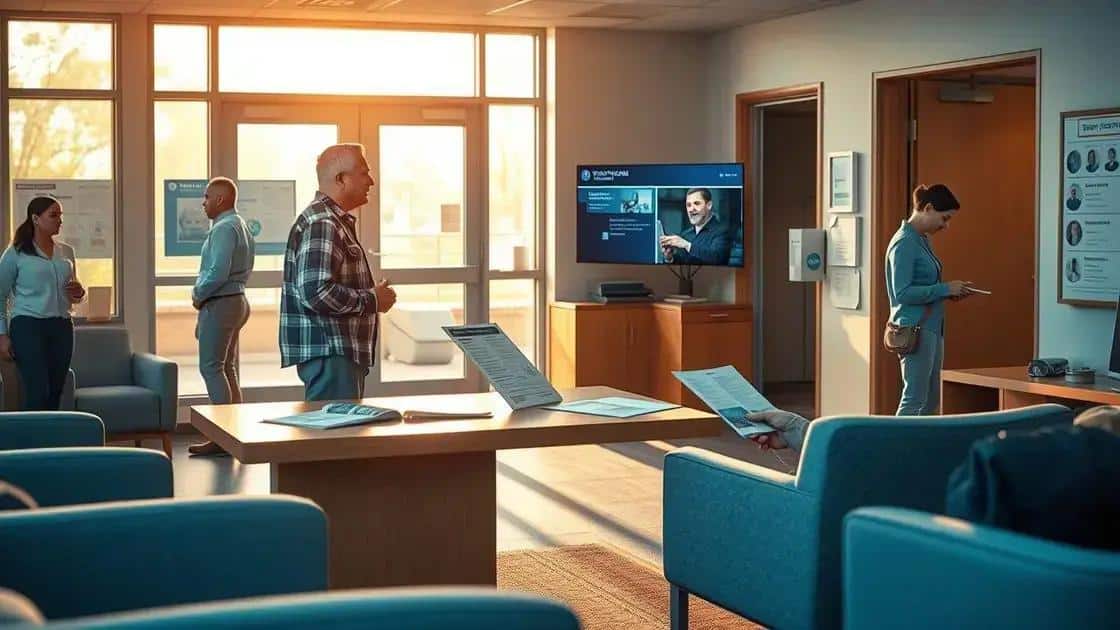Veteran support services: unlock the benefits today

Veteran support services provide essential resources such as healthcare, education, housing, and employment assistance, ensuring that veterans transition successfully to civilian life and positively impact their communities.
Veteran support services play a crucial role in helping those who have served our country. Whether you’re seeking guidance, community, or practical help, these services can make a significant difference in your life. Let’s dive into their offerings and how they can empower you!
Understanding veteran support services
Understanding veteran support services is essential for anyone who has served and their families. These services are designed to help veterans navigate life after military duty, offering a variety of resources that address both physical and emotional needs.
Many veterans may not realize what these support services entail. They can range from healthcare to educational benefits, housing assistance, and even mental health support. Understanding these options can make a significant difference in transitioning back to civilian life.
Types of Support Available
There are various types of veteran support services available today, aimed at catering to different aspects of a veteran’s life.
- Healthcare Services: This includes access to medical facilities, specialized care for conditions related to military service, and mental health services.
- Educational Assistance: Programs like the GI Bill help veterans pursue education and training opportunities, allowing them to further their skills.
- Housing Support: Many organizations provide resources to help veterans find stable housing, whether through grants or housing vouchers.
- Employment Services: Career counseling and job placement services are available to help veterans enter the workforce successfully.
Connecting with these support services is crucial. They not only provide assistance but also foster a sense of community among veterans. Many organizations develop programs that encourage camaraderie and offer peer support to those in need.
Veterans may also benefit from local community resources that work in conjunction with veteran services. This could mean participating in local veteran events or workshops that educate and inform about available services. Through these connections, veterans can find a path tailored to their circumstances.
By understanding the landscape of veteran support services, those who have served can better access the help they need. It’s about making informed choices and embracing all available resources.
Types of support available for veterans
Understanding the types of support available for veterans is key to accessing the right assistance. These supports address various needs, helping veterans navigate through life’s challenges after service.
The primary types of support fall into several categories. Each category targets specific aspects of a veteran’s life, ensuring that all needs are met effectively.
Healthcare Services
Many veterans struggle with health issues that stem from their time in service. Healthcare services provide critical medical care tailored for these individuals.
- Access to VA hospitals: Veterans have access to government-funded hospitals offering specialized care.
- Mental health support: Services include counseling and therapy for PTSD and other mental health conditions.
- Rehabilitation programs: These programs assist veterans recovering from injuries, ensuring they regain their physical capabilities.
It’s essential for veterans to utilize these resources to maintain their health and well-being.
Educational Assistance
Education plays a vital role in transitioning to civilian life. Many veterans benefit from educational assistance programs.
- GI Bill: This program covers tuition and fees for veterans attending college, university, or vocational training.
- Scholarships: Numerous organizations offer scholarships specifically for veterans to ease the financial burden of education.
- Job training programs: These programs focus on developing skills that are in demand in today’s job market.
Such educational support helps veterans become competitive in the workforce, paving the way for successful careers.
Housing Support
Housing stability is critical for returning veterans. Housing support offers several avenues for assistance.
- Subsidized housing: Veterans can access affordable housing options through various organizations.
- Housing grants: These grants assist veterans looking to purchase their own homes by providing financial aid.
- Supportive housing programs: Some programs focus specifically on homeless veterans, providing shelter and rehabilitation.
Ensuring stable housing is essential for a successful adjustment to civilian life.
Employment Services
Finding employment is often a significant challenge. Employment services are in place to support veterans in their job search.
- Career counseling: Professionals offer guidance on resume building, interview preparation, and job searching strategies.
- Job fairs: Many locations hold job fairs specifically for veterans to connect with potential employers.
- Skills training: Training programs help veterans acquire new skills necessary for different job fields.
Accessing these services can result in meaningful employment opportunities.
How to access veteran support services

Accessing veteran support services is crucial for those who have served. Knowing how to navigate these resources can empower veterans and their families, helping them lead fulfilling lives.
The first step in accessing these services is understanding where to go. Various organizations provide support, and it’s important to identify the right ones based on specific needs.
Finding Resources
Veterans can start by visiting official websites that list veterans’ services. The Department of Veterans Affairs (VA) is a valuable resource for this.
- The VA website: It offers comprehensive information about benefits, healthcare, and other support services.
- Local veterans’ centers: Many communities have veteran centers that provide personalized guidance.
- Nonprofit organizations: Groups like the American Legion and Veterans of Foreign Wars offer assistance and can help connect veterans with resources.
These platforms serve as excellent starting points for identifying specific needs and available support.
Understanding Eligibility
It’s essential for veterans to understand eligibility requirements for different programs. These requirements can vary widely depending on the type of support.
- Healthcare eligibility: Veterans must enroll in the VA healthcare system, which requires specific documentation.
- Educational programs: Benefits like the GI Bill have guidelines regarding time served and other factors.
- Housing assistance: Programs often require proof of service and financial status.
Understanding these requirements helps streamline the application process, ensuring veterans can access the support they need.
Application Process
The application process may seem daunting, but it is straightforward with the right guidance. Once you know what services you need, completing applications can be easier.
- Gather documents: This may include discharge papers, financial information, and identification.
- Contact support staff: Many organizations have trained personnel who can assist in navigating the application.
- Follow up: After submitting applications, it’s wise to check back regularly to address any issues that may arise.
By staying proactive, veterans can effectively manage their applications and ensure they receive the necessary support in a timely manner.
Navigating veteran support services doesn’t have to be overwhelming. With the right resources, understanding of eligibility, and a clear application process, veterans can successfully access the services aimed at improving their lives.
Impact of veteran support services on communities
The impact of veteran support services on communities is profound and far-reaching. These services not only aid veterans but also enrich the communities in which they reside.
When veterans receive the support they need, they can better integrate into civilian life. This positive transition leads to a ripple effect throughout the community.
Strengthening Local Economies
Veterans who access support services can contribute effectively to the local economy. As they secure jobs and housing, they become active participants in their communities.
- Job creation: Veterans often start businesses, leading to job openings and stimulating economic growth.
- Increased spending: As veterans achieve financial stability, they spend more on local goods and services, boosting local businesses.
- Volunteerism: Many veterans give back by volunteering, sharing skills and resources that benefit the community.
Such contributions can revitalize neighborhoods and foster a strong community spirit.
Fostering Community Cohesion
Veteran support services play a vital role in fostering connections among individuals. This brings people together towards a common goal.
- Community events: Many organizations host events that unite veterans and civilians, creating bonds of understanding.
- Peer networks: Support groups help veterans share experiences, which can enhance friendships and reduce isolation.
- Collaborative projects: Many veterans collaborate with community members on projects to improve local areas, which builds trust and cooperation.
These interactions help reduce divisions and promote a culture of inclusion.
Encouraging Mental Wellness
Access to veteran support services significantly enhances mental health for both veterans and their families. Healthy individuals contribute to healthier communities.
- Access to mental health resources: Veterans tapping into these resources helps address issues like PTSD.
- Workshops and programs: Many programs focus on coping strategies, benefiting everyone involved.
- Awareness campaigns: Increased understanding of veteran issues leads to more community support and acceptance.
A community that prioritizes mental wellness ultimately thrives.
The symbiotic relationship between veteran support services and community well-being fosters a culture of growth, resilience, and understanding. As veterans thrive, so do their communities, leading to a stronger, united society.
Success stories: veterans benefiting from support services
Success stories about veterans benefiting from support services highlight the positive impact these programs have on lives. These stories inspire others and illustrate the possibilities available.
Many veterans have overcome challenges, thanks to the assistance they received. These narratives often serve as powerful examples of resilience and the benefits of community support.
Transformative Healthcare Experiences
One common theme in success stories is the profound change veterans experience through healthcare services.
- John’s journey: After struggling with PTSD, John sought help through a VA program. With therapy and support, he regained his confidence and began volunteering in his community.
- Lisa’s recovery: Lisa, a disabled veteran, accessed rehabilitation services that helped her regain mobility. Today, she participates in community sports, inspiring others with disabilities.
- Mark’s mental health: Mark found support through counseling services tailored for veterans. His journey highlights the importance of seeking help and breaking the stigma around mental health.
These examples remind us of the essential role of healthcare in a veteran’s life.
Education and Career Advancements
Education plays a vital role in transforming lives, and many veterans have leveraged educational support to build successful careers.
- Tom’s success: After serving, Tom utilized the GI Bill to go back to school. He earned a degree in engineering and now works for a leading tech company.
- Maria’s reinvention: Maria attended vocational training funded by a local nonprofit. She now owns her own salon and employs fellow veterans.
- Sam’s journey: Sam participated in job training programs that connected him to employers. He now enjoys a fulfilling career in the trades.
These stories showcase how educational resources can lead to fulfilling careers and personal growth.
Community Impact through Housing Support
Housing support services have also played a significant role in veterans’ success stories. Stable housing is a cornerstone of a successful transition.
- Anna’s stability: After struggling with homelessness, Anna accessed housing assistance that provided her with a safe place to live. Now, she advocates for other veterans facing similar struggles.
- Chris’s home: Chris received a housing grant to purchase his first home. He often invites other veterans over for BBQs, fostering a supportive community.
- Jesse’s outreach: Jesse has started a program that aids veterans in finding housing and connecting them to necessary resources.
The experiences of veterans highlight the importance of housing services in fostering stability and community ties.
Success stories of veterans benefiting from support services illustrate the transformative power of these programs. They inspire hope and show the immense possibilities available to those who seek help.
In conclusion, the journey of veterans accessing support services is a powerful testament to resilience and community support. By utilizing available resources, many veterans transform their lives, embarking on paths to success, stability, and personal growth. Whether through healthcare, education, or housing, the impact of these services can be life-changing. Success stories inspire others to seek help and embrace the possibilities ahead. Together, we can continue to support our veterans, ensuring they thrive in their civilian lives.
FAQ – Frequently Asked Questions about Veteran Support Services
What types of support services are available for veterans?
Veterans can access healthcare, educational assistance, housing support, and employment services to help them transition successfully to civilian life.
How can veterans access these support services?
Veterans can access support services through the Department of Veterans Affairs website, local veterans’ centers, and nonprofit organizations dedicated to veterans’ assistance.
Are there success stories of veterans who have benefited from these services?
Yes, many veterans have shared inspiring stories of how healthcare, education, and housing support have transformed their lives and enabled them to thrive in their communities.
How do these services impact communities?
Veteran support services not only help veterans but also strengthen communities by promoting economic growth, enhancing community cohesion, and encouraging volunteerism among veterans.






